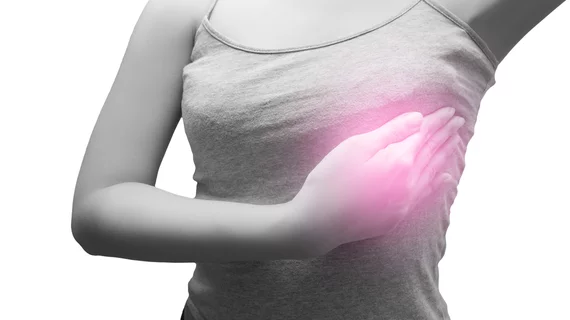Artificial intelligence bolsters radiologists’ ability to pinpoint breast cancer
A new artificial intelligence algorithm is showing promising results in boosting radiologists’ ability to spot breast cancer and reduce false positives.
South Korean researchers recently tested the clinical tool in a retrospective study of more than 170,000 mammography examinations. Co-author Eun-Kyung Kim, MD, and colleagues found that AI helped increase radiologists’ sensitivity for detecting the disease by 9.5 percentage points, up to almost 85%, according to their study, published Feb. 6 in Lancet Digital Health.
The authors believe their AI tool could eventually have a sizeable impact in catching cancer early and avoiding more costly and potentially harmful treatments down the line.
“One of the biggest problems in detecting malignant lesions from mammography images is that to reduce false negatives—missed cases—radiologists tend to increase recalls, casting a wider safety net, which brings an increased number of unnecessary biopsies,” Kim, a breast radiologist at Yonsei University Severance Hospital in Seoul, said in a statement. “It requires extensive experience to correctly interpret breast images, and our study showed that AI can help find more breast cancer with lesser recalls, also detecting cancers in its early stage of development.”
Kim and colleagues found that their AI tool consistently performed better than human radiologists on its own, too. That included better sensitivity in detecting breast cancer with mass (90% for AI, versus 78% for MDs), and distortion or symmetry (90% vs. 50%). The model also excelled at diagnosing early stage invasive forms of the disease, pinpointing 91% of T1 cancers and 87% of node-negative versions, compared to just 74% on both counts for human radiologists.
AI also proved less susceptible to breast density masking mammography results than clinicians. When assisted by artificial intelligence, however, radiologists’ sensitivity when interpreting dense breasts went up 11 percentage points.
Kim and colleagues hope to further flesh out these findings, including clinical trials as a possible next step, according to the study.
“The diagnostic performance of radiologists was significantly improved with the assistance of AI,” the team concluded. “This result shows that AI can be used as an effective diagnostic support tool for breast cancer detection, which is worth evaluating in prospective clinical trials.”

